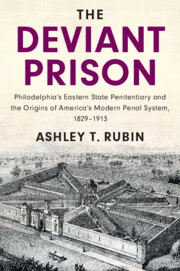 The Deviant Prison
The Deviant Prison Book contents
- Frontmatter
- Contents
- List of Figures
- List of Tables
- Acknowledgements
- List of Abbreviations
- A Brief Timeline
- Important Actors
- Introduction
- Part I Becoming the Deviant Prison: Establishing The Conditions for Personal Institutionalization
- Part II THE ADVANTAGE OF DIFFERENCE: The Process of Institutionalization
- Part III Forced to Adapt: The Conditions for and Process of Deinstitutionalization
- 9 An Alternative Status: Administrators’ Transition from Gentleman Reformers to Professional Penologists
- 10 Fading Away: National Obscurity, Catastrophic Overcrowding, and the Individual Treatment System
- Appendix A Inspectors
- Index
10 - Fading Away: National Obscurity, Catastrophic Overcrowding, and the Individual Treatment System
from Part III - Forced to Adapt: The Conditions for and Process of Deinstitutionalization
Published online by Cambridge University Press: 12 January 2021
- Frontmatter
- Contents
- List of Figures
- List of Tables
- Acknowledgements
- List of Abbreviations
- A Brief Timeline
- Important Actors
- Introduction
- Part I Becoming the Deviant Prison: Establishing The Conditions for Personal Institutionalization
- Part II THE ADVANTAGE OF DIFFERENCE: The Process of Institutionalization
- Part III Forced to Adapt: The Conditions for and Process of Deinstitutionalization
- 9 An Alternative Status: Administrators’ Transition from Gentleman Reformers to Professional Penologists
- 10 Fading Away: National Obscurity, Catastrophic Overcrowding, and the Individual Treatment System
- Appendix A Inspectors
- Index
Summary
From the very beginning, Eastern’s administrators’ autonomy was challenged directly by occasional incursions from the local penal reformers and indirectly by the state legislature's lackluster patronage. These challenges became more invasive in the 1850s, peaking in the 1860s. In response, Eastern's administrators sought to establish jurisdiction over their prison by proclaiming their own special expertise and insisting on deference in matters affecting Eastern. By the 1870s, however, penal actors on the national stage were likewise proclaiming their own expertise and professional status, while Eastern's administrators felt increasingly irrelevant. In response to these national-level developments, the administrators further developed their claims to professional status. In this context, the administrators' claims to professional status provided them a more promising path to self-aggrandizement than continuing to proclaim the Pennsylvania System's superiority. Consequently, the administrators shifted their focus from the Pennsylvania System to their status as professional penologists. It was this shift from defense to professionalization that deinstitutionalized the Pennsylvania System.
Keywords
- Type
- Chapter
- Information
- The Deviant PrisonPhiladelphia's Eastern State Penitentiary and the Origins of America's Modern Penal System, 1829–1913, pp. 296 - 324Publisher: Cambridge University PressPrint publication year: 2021
